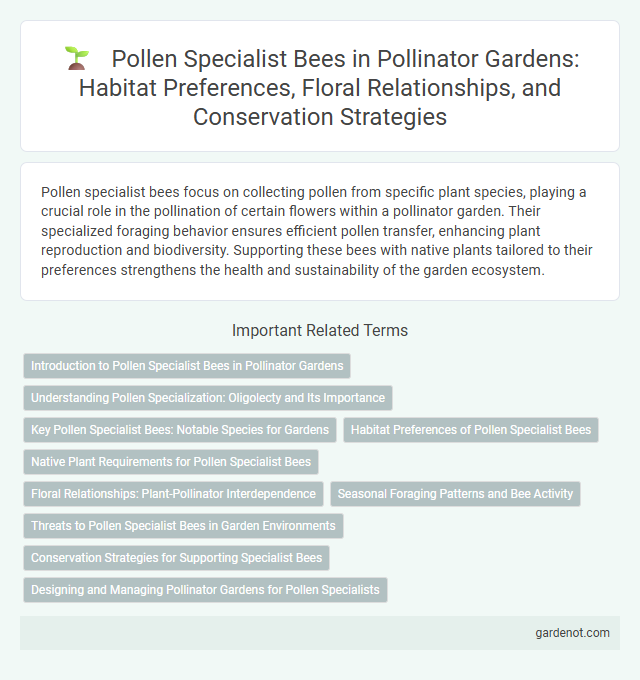Pollen specialist bees focus on collecting pollen from specific plant species, playing a crucial role in the pollination of certain flowers within a pollinator garden. Their specialized foraging behavior ensures efficient pollen transfer, enhancing plant reproduction and biodiversity. Supporting these bees with native plants tailored to their preferences strengthens the health and sustainability of the garden ecosystem.
Introduction to Pollen Specialist Bees in Pollinator Gardens
Pollen specialist bees, also known as oligolectic bees, collect pollen exclusively from a limited range of plant species, making them crucial for the pollination of certain native flora. These bees play a vital role in maintaining biodiversity and enhancing the ecosystem services in pollinator gardens by ensuring the reproduction of specialized plants. Incorporating native plants that support pollen specialist bees increases the health and resilience of pollinator gardens, promoting sustainable habitat conservation.
Understanding Pollen Specialization: Oligolecty and Its Importance
Pollen specialist bees, known as oligolectic species, collect pollen exclusively from a narrow range of plant species, ensuring effective pollination and plant reproduction. This specialization supports the health of native ecosystems by fostering co-evolution between bees and their preferred flora, enhancing biodiversity. Understanding oligolecty reveals the crucial role these bees play in maintaining the stability and resilience of pollinator gardens and natural habitats.
Key Pollen Specialist Bees: Notable Species for Gardens
Key pollen specialist bees such as the squash bee (Peponapis pruinosa) and the sunflower bee (Diadasia spp.) play a crucial role in pollinator gardens by exclusively foraging on specific plant families, ensuring efficient pollination and higher seed yields. These bees exhibit strong plant-bee fidelity, which enhances pollination success for crops like pumpkins, squashes, and sunflowers. Incorporating native plants that attract these specialist bees supports biodiversity and improves garden productivity through targeted pollination.
Habitat Preferences of Pollen Specialist Bees
Pollen specialist bees thrive in habitats rich in specific flowering plants that provide their exclusive pollen sources, often favoring native meadows and undisturbed natural areas. These bees exhibit strong fidelity to certain plant species, requiring environments where these flora are abundant and diverse to sustain their populations. Habitat fragmentation and loss of native plant diversity directly threaten pollen specialist bees by limiting their access to essential pollen resources.
Native Plant Requirements for Pollen Specialist Bees
Pollen specialist bees, also known as oligolectic bees, rely exclusively on specific native plants for pollen collection, making the preservation of these plants critical for their survival. These bees depend on native wildflowers, such as goldenrods (Solidago) and sunflowers (Helianthus), which provide the unique pollen resources required for larval development. Managing pollinator gardens with a diverse selection of region-specific native plants supports the foraging needs and reproductive success of pollen specialist bee populations.
Floral Relationships: Plant-Pollinator Interdependence
Pollen specialist bees exhibit highly specific floral relationships, relying on a limited range of plant species to gather pollen essential for their nutrition and reproduction. This close interdependence ensures effective pollination, enhancing plant reproductive success and biodiversity within the ecosystem. The mutualistic bond between pollen specialist bees and their preferred flowers drives coevolution, sustaining the health of pollinator gardens.
Seasonal Foraging Patterns and Bee Activity
Pollen specialist bees, or oligolectic bees, exhibit distinct seasonal foraging patterns tightly aligned with the bloom periods of their preferred host plants, often resulting in synchronized peak activity during specific months. These bees demonstrate high fidelity to certain pollen sources, optimizing their foraging efficiency within narrow temporal windows that match floral availability. Their bee activity is crucial for the pollination of specialized plants, making them key contributors to the biodiversity and health of pollinator gardens throughout the growing season.
Threats to Pollen Specialist Bees in Garden Environments
Pollen specialist bees face significant threats in garden environments due to habitat loss and reduced availability of their preferred flowering plants, which directly impacts their foraging efficiency and reproductive success. Exposure to pesticides and chemicals commonly used in gardens further exacerbates their decline by disrupting their nervous systems and impairing navigation. Conservation efforts targeting diverse native plantings and limiting chemical use are crucial for sustaining pollen specialist bee populations and maintaining pollination ecosystem services.
Conservation Strategies for Supporting Specialist Bees
Conservation strategies for supporting pollen specialist bees emphasize the preservation of native plant species critical to their lifecycle, ensuring continuous availability of specific floral resources. Habitat restoration projects prioritize planting host plants that specialist bees rely on, enhancing foraging efficiency and reproductive success. Protecting nesting sites and reducing pesticide exposure further support the sustainability of these essential pollinators within pollinator gardens.
Designing and Managing Pollinator Gardens for Pollen Specialists
Designing and managing pollinator gardens for pollen specialist bees requires selecting native plant species that provide targeted pollen sources critical for their survival and reproduction. Incorporating diverse bloom periods ensures continuous pollen availability, meeting the seasonal needs of specialist bees such as the squash bee (Peponapis pruinosa) and the blueberry bee (Habropoda laboriosa). Proper garden management includes minimizing pesticide use and maintaining habitat features like bare ground or nesting sites that support these specialized pollinators' life cycles.
Pollen specialist bee Infographic

 gardenot.com
gardenot.com